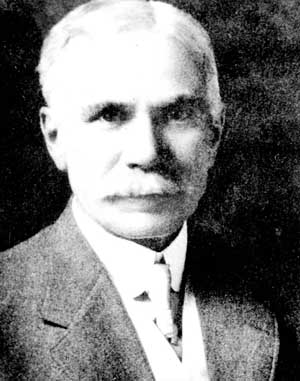On March 3, 1896, Seattle voters elect Republican Frank Dewitt Black (1854-1919) mayor of Seattle. Black, a well-regarded Seattle businessman with no particular interest in politics, agrees to run in order to prevent a progressive candidate from being elected. But he soon realizes that the give-and-take of politics is not for him. He resigns three weeks after being sworn in, earning considerable scorn as well as the questionable cachet of having served the least amount of time of any elected mayor in Seattle's history.
Three Weeks
Seattle Republicans were frantic in early 1896. An ongoing economic depression, which by then was nearly three years old, had helped spawn not one but two populist candidates vying for the mayoralty in the municipal election that March. Though one of the populists was a Democrat, the second candidate was attractive to some local Republicans. There were concerns that this candidate might siphon enough votes away from a mainstream Republican candidate to give the election to the populist Democrat, unless the Republicans could present a candidate strong enough to gather a majority of votes.
That was Frank Black. A respected businessman, Black had no trouble winning comfortably in the municipal election on March 3, 1896. However, there was no honeymoon. Black quickly grew frustrated with people approaching him for favors before he was even sworn in. This frustration showed at his swearing-in ceremony, which took place at City Hall on March 16. After receiving a warm welcome -- and a friendly warning about the press -- from the outgoing mayor, Byron Phelps (1842-1934), Black stepped forward and spoke a few words. "I thank you, Mr. Mayor, for your kind words and well wishes for me." He paused briefly, then continued, almost ominously: "But as regards the pleasures of the office, Mr. Mayor, of which you have just spoken, if the past week is any criterion of them, I am afraid you will have to be seeking a new mayor before long" ("Presto and Change").
He wasn't joking. He continued to be deluged with office seekers and politicians looking for favors. They stopped by his office during the day. They stopped by at his house on Beacon Hill during the evening. He couldn't stand it. To the astonishment of nearly everyone in Seattle, Black resigned three weeks after being sworn in. There were some on the city council who knew it was coming, but virtually everyone else was floored when he announced his resignation in a letter to the Seattle City Council, which was read at its session on April 6. He cited ill health, but few were fooled.
Feeble Surrender
Though there were some polite expressions of sympathy, there also was plenty of scorn. The Seattle Post-Intelligencer was especially scathing: "The general opinion will be that he was lacking in that moral courage which was believed to be one of his chief qualifications for the mayoralty ... the citizens of Seattle are disagreeably surprised at the lack of stamina and sense of responsibility he has shown in so feebly surrendering his opportunities ..." ("Mr. Black's Resignation").
The Seattle Times was kinder: "The majority of people, after the first moments of excitement and surprise passed away, took the sensible view -- and gave Mr. Black credit for meaning just what he said in his letter" ("Town's New Mayor"). The paper philosophically added in an editorial, "He must regret as much as any one can the undesirable aspect in which he appears before his fellow citizens" ("The Mayoralty Matter").
Yet the Times wasn't able to resist a poke at the outgoing mayor. In the same issue, it published a tongue-in-cheek note written to Black by Dr. J. Eugene Jordan, who had placed second to Black in the election. Jordan included a gift of what the Times called "nerve medicine" along with his note:
"Hon. F.D. Black: Permit me to enclose a box of my celebrated remedy P. It is particularly valuable in cases of nerve deterioration. In cases of that nature an early treatment is quite necessary. In fact I believe you should have been taking it for the last three weeks. Very respectfully, J. Eugene Jordan, M.D." ("Town's New Mayor").
Doleful Distinction
Black recommended that the council appoint William D. Wood (1858-1917), a well-known real estate developer, and the council obliged. However, Wood did not complete the term either. He saw a golden opportunity when the Klondike Gold Rush began in earnest the following year, and he joined others to form a partnership that established a transport company to ferry miners to the Yukon. He took a leave of absence to pursue this venture, but when he failed to timely return, the city council voted to replace him with four months remaining in his term.
Black went on to a successful career in commercial real estate. He bears the doleful distinction of having served the shortest amount of time of any elected mayor in Seattle's history. The use of the word elected is deliberate, because in 2017, Bruce Harrell (b. 1958) served as Seattle's acting mayor for five days after the resignation of mayor Ed Murray (b. 1955). But there are two key differences. Harrell was appointed, not elected, and he declined the appointment within the time allotted by the city charter. Thus, a legitimate argument can be made that Black's spot in Seattle's history remains secure.

